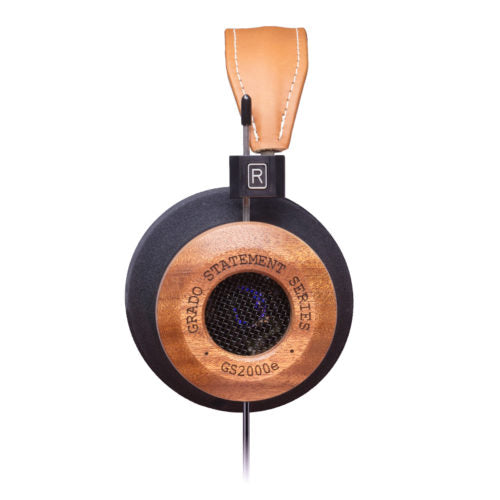The Grado GS2000e is a brand-spanking new headphone with a hefty $1395 price tag, to boot. But novelty and expense aside, why should you buy this headphone? Let us give you some reasons.
Packaged in a standard heavy-corrugated cardboard box, the Grado GS2000e comes with an extension cable, and a mini adapter (female 1/4” to 3.5mm male). No frills, no junk extras. Sweet and to the point.
Comfort is as dreamlike as it is on any other over-ear Grado; if you aren’t a fan of Grado’s S- or L-Cushion, you’ll love the completely circumaural G-Cushion that comes with the 2000e. Heft or weight isn’t anywhere near as bad as on the PS1000e, and more in line with the GS1000e.
Design-wise, the biggest feature on this headphone is going to be the wood used in the earcups – mahogany and maple woods. Ostensibly, this offers better tonal control, with the maple imparting a brighter edge while the mahogany elements keep the maple’s natural qualities somewhat in check.
Specs
Transducer Type: Dynamic
Operating Principle: Open Air
Frequency Response: 4 – 51,000 hz
SPL 1mW: 99.8 dB
Normal Impedance: 32 ohms
Driver Matched dB: .05 dB
As we can see from these specifications, the Grado GS2000e offers a wide frequency range, moderate volume, and a low impedance of 32 ohms. So, contrary to popular belief, you don’t really need to drive these (or any other Grado, for that matter) too hard. In fact, using them with your portable player or computer would be just fine.
Low End
The low end detail on the GS2000e is well-defined and well-controlled, without any bleeding in male vocals, and a general sense of articulation and contrast regardless of the source material. Bass is deep, but not too deep. It stays accurate and lifelike, with excellent separation between male vocals and low-frequency notes.
Mids
The mid-range is equally impressive, with good, clean detail that the whole family can enjoy. Here the accuracy is close to downright clinical, with an exacting level of fidelity that I really appreciated when it came to classical music.
High End
While the mahogany does a good job with the mids and lows, the maple imparts a certain edge to the high end. As such, I’d say the GS2000e is just slightly bright, with ever-so-slightly-piercing high highs. Overall, though, the high end is fairly well-controlled, and the general impression is again one of accuracy.
Soundstage
Holy headphones. The soundstage on the Grado GS2000e is astounding, with a sense of clarity and placement you don’t see in even the GS1000e. Even with some more compressed tracks (think 90s pop-punk), there’s still a sense of space to the music, and you can pinpoint where each instrument is coming from.
Versus the GS1000e
Perhaps the biggest question for most fans of Grado is “How does it compare to the older GS1000e?” When stacked side-by-side, and given a decent A-B test, the 1000e has a tendency to sound more dynamic, with higher highs and lower lows. There’s a greater sense of brightness, and a greater deal of impact where bass is concerned. In contrast, the 2000e sounds a bit more relaxed – almost even-sounding. Between the two, the soundstage remains too close to call, but the newer GS2000e unarguably delivers better clarity and separation.
Overall Impressions
The GS2000e is an odd new headphone, the first Grado to offer two different types of wood. Even when I check the part of me that’s a Grado fanboy, the superior sound still wins me over. Forget these are handmade headphones. Forget they have two different types of wood in there. Forget they’re fashioned by American workers in a Brooklyn townhouse. Forget that Grado has been family-owned-and-operated for the past 60 years. These things still sound freaking fantastic, and THAT isn’t something you’re likely to forget.
While these headphones did okay with most genres, they do sound pretty relaxed. And that obviously isn’t going to be everyone’s cup of tea. I could easily appreciate the sound with classical and old-school hip hop (vocal-heavy stuff with less reliance on beats). Rock and roll, though, could be a little lacking at times. So these may very well be hit-or-miss with the Headphone Community at large.
Recommendations
If you’re after a dynamic-sounding open-back headphone, and you love the look of Grados, skip this model and opt out for the cheaper GS1000e. However, if you’re a fan of that relaxed sound, and you just so happen to love hearing almost everything in a given track, you will not be disappointed with the GS2000e. Of course, if you can try it before you buy it, even better.
So stop reading this review and come on down to our Manhattan showroom to try out a pair for yourself!
Get the Latest Headphone News and Reviews in Your Inbox
Subscribe to our newsletter and get 10% off your first purchase!*
*some restrictions may apply


 FREE Shipping
FREE Shipping




